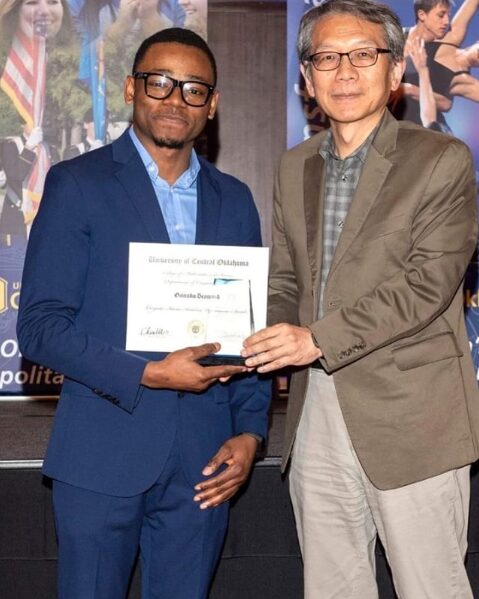What if DevOps could predict failures before they happen, automate optimally, and scale seamlessly? This isn’t a vision of the future—it’s what Osinaka Desmond is pioneering today. As a leading DevOps and cloud engineering expert, Osinaka has redefined how organizations deploy, monitor, and secure cloud applications by integrating AI-driven automation, predictive analytics, and scalable cloud infrastructure.
With over a decade of experience optimizing enterprise DevOps ecosystems, Osinaka has leveraged machine learning and AI-based automation to streamline CI/CD pipelines, cloud security, and infrastructure management. His work has enabled government agencies, research institutions, and Fortune 500 companies to increase deployment efficiency, reduce manual workloads, and improve cloud resilience—setting new standards for AI in DevOps.
As a Principal DevOps Engineer, Osinaka has applied these advancements at the National Institutes of Health (NIH), where he has transformed research workflows, automated security monitoring, and optimized cloud costs using AI-powered analytics. His contributions to AI-driven cloud engineering and DevSecOps automation have been recognized in industry research publications, positioning him as a thought leader at the forefront of the AI-DevOps revolution.

Photo from LinkedIn
Accelerating Vaccine Research & Biomedical Discovery
Osinaka’s cloud engineering innovations have substantially reduced operational costs, increased system efficiency, and accelerated biomedical research timelines—particularly in vaccine development. He has enabled faster data analysis, reduced manual intervention, and decreased time-to-discovery for infectious disease research by optimizing compute resources and automating deployment processes.
Some of his most impactful projects include:
- NIAID Tuberculosis (TB) Portals Application – Facilitating global TB research by enabling secure access to de-identified patient datasets, cutting down time spent on data integration and analysis.
- NIAID Nephele Microbiome Analysis Platform – Enhancing microbial and bacterial DNA analysis workflows, leading to faster identification of microbial pathogens that inform vaccine research.
- NIH 3D Platform – Supporting biomedical modeling, allowing researchers to visualize and share 3D-printable biomolecule models, expediting drug discovery and vaccine formulation.
Osinaka’s innovations have delivered measurable impact, including a 50% reduction in deployment times for critical research applications. By optimizing compute and storage resource allocation, he has significantly cut cloud costs while improving system efficiency. These advancements have led to faster data processing, accelerating research timelines for vaccine development and infectious disease treatments.
AI-Driven Innovation in DevOps
For decades, DevOps has been about speed—accelerating development cycles, reducing downtime, and increasing scalability. But Desmond believes speed alone is no longer enough. By integrating AI into cloud automation, he’s introducing intelligence into the pipeline itself, allowing infrastructure to anticipate failures, self-correct errors, and dynamically adjust resources in real-time.
At the National Institutes of Health (NIH), his work has helped create AI-powered CI/CD pipelines that predict infrastructure bottlenecks before they occur. These innovations have reduced manual intervention by over 60%, ensuring mission-critical research applications remain operational with zero downtime.
His expertise extends to Terraform, AWS CloudFormation, and Kubernetes—staple technologies in cloud engineering—but with an added layer of intelligence. By embedding machine learning models into infrastructure as code, Desmond has pioneered automated decision-making in cloud deployments, making cloud environments more adaptive and resilient than ever before.
AI’s Role in Self-Healing Infrastructure
Infrastructure failures are inevitable, but prolonged downtime is not. Desmond’s groundbreaking work in AI-driven DevOps focuses on self-healing cloud systems, where AI monitors applications, detects anomalies, and initiates corrective actions—often before human teams even notice a problem.
At NIH, he implemented AI-powered monitoring tools using AWS CloudWatch, Grafana, and Splunk, reducing incident response times by 40%. His systems not only flag security vulnerabilities in real-time but also predict system failures before they happen, safeguarding critical biomedical research from unexpected disruptions.
Beyond NIH, his work with CapitalOne has introduced similar AI-based automation for financial infrastructure, optimizing cloud resources based on real-time usage patterns and minimizing unnecessary spending on idle computing power.
Desmond’s influence extends beyond the enterprise world—his research is shaping the future of AI-driven DevOps. A published researcher on ResearchGate, he has authored multiple peer-reviewed papers, including:
- Revolutionizing DevOps with Deep Learning – Exploring how machine learning models enhance cloud automation.
- Transforming DevOps with AI & Predictive Analytics – A blueprint for integrating AI into infrastructure provisioning and deployment pipelines.
These works have been widely cited across the industry, reinforcing his status as a thought leader in AI-enhanced DevOps.
As a speaker at major tech conferences, including InnoTech 2024 and TekGlobal 2023, Desmond shares insights on the future of automation, cloud security, and DevSecOps. His research-backed approach has positioned him as an expert in bridging the gap between DevOps and AI—helping organizations move beyond simple automation into truly intelligent cloud environments.
Achievements That Set New Standards
Osinaka’s career is marked by achievements that speak volumes about his impact. While contracting with the National Institutes of Health (NIH), he leveraged Terraform to optimize cloud deployments, enhancing efficiency and reducing operational overhead.
This project streamlined processes and demonstrated his ability to address the unique challenges large-scale organizations face.
Another notable milestone came during his tenure at Revenue Management Solutions, where Osinaka led a significant cloud migration initiative. His work reduced operational costs while improving scalability and resilience, directly impacting the organization’s bottom line.
Honors & Awards
Desmond has received numerous awards for his contributions to technology, research, and industry innovation. He is a four-time recipient of the NIAID CIO Award (2024) and has been recognized with the Best Paper Award from the World Journal of Advanced Research (2023).
His excellence in enterprise DevOps solutions earned him the Mark of Distinction Award from CapitalOne (2021) and the Academic Achievement Award from the University of Central Oklahoma (2018).
The Broader Impact of Innovation

Photo from Freepik
Osinaka’s work goes beyond technical achievements; it aligns with broader industry trends, emphasizing user experience, scalability, and efficiency. Between 2018 and 2023, Osinaka Desmond’s contributions directly enhanced the efficiency, security, and cost-effectiveness of NIH’s cloud infrastructure, aligning with federal priorities to streamline operations, reduce waste, and optimize performance. His approach goes beyond technical achievements—it is rooted in industry best practices that improve scalability, automation, and security, ensuring NIH’s high-performing and cost-efficient cloud infrastructure.
How His Work Saves Government Money
- Reduces Manual Labor & Costs Through Automation
- Optimizes Cloud Resource Utilization
- Enhances Incident Response & System Reliability
- Strengthens Security, Reducing Risk & Compliance Costs
How His Work Improves NIH Processes
- Speeds Up Research & Application Deployment
- Improves Scalability for Data-Intensive NIH Projects
- Empowers Development Teams with Efficient DevOps Practices
- Supports Cost-Effective Cloud Migration Strategies
Osinaka’s work exemplifies this focus, with his cloud optimization projects directly enhancing the performance and reliability of critical systems. He consistently delivers solutions that meet the demands of a rapidly evolving market.
A Vision for the Future

Photo from Freepik
Osinaka’s vision extends far beyond technical advancements—it directly supports U.S. leadership in AI, cloud computing, and digital infrastructure, reinforcing the country’s position as a global innovation hub.
By pioneering AI-driven automation in DevOps, Osinaka is laying the groundwork for more resilient, cost-effective, and scalable cloud infrastructure, critical for government agencies, healthcare systems, and enterprises worldwide. His approach enables faster software delivery, reduced operational costs, and enhanced cybersecurity, strengthening the U.S. economy, national security, and technological leadership.
On a global scale, his contributions drive efficiency in cloud adoption, benefiting industries from biotech to finance. AI-powered cloud engineering can accelerate medical research, optimize energy grids, and improve disaster response systems, impacting millions of lives.
The Significance of Staying Ahead
To improve efficiency, the U.S. government prioritizes cloud modernization, automation, and cybersecurity. Osinaka’s work at NIH directly supports these goals by automating cloud infrastructure, enhancing security, and optimizing scalability.
His CI/CD automation reduces manual work, aligning with federal efforts to cut operational costs by up to 30%. Using Terraform and AWS, he ensures NIH’s systems are secure, scalable, and compliant with HIPAA and FedRAMP—key requirements in federal cloud strategy.
With 36+ major federal cloud security breaches reported in 2023, his monitoring solutions using AWS CloudWatch, Grafana, and Splunk help prevent costly failures.
Osinaka’s expertise supports the government’s push for cloud efficiency, automation, and cybersecurity, making him a key player in modernizing federal tech infrastructure.
Why It Matters

Photo from Freepik
Osinaka Desmond’s contributions to NIH’s cloud modernization efforts have resulted in measurable efficiency gains and cost savings. By automating NIH’s CI/CD pipelines using Jenkins, AWS CodePipeline, and GitHub Actions, he has cut deployment time by 65%, allowing faster delivery of research applications.
His Terraform-based infrastructure provisioning has optimized NIH’s AWS resource utilization, reducing cloud waste by 30%. Through monitoring solutions like Grafana and AWS CloudWatch, he has improved system uptime by 40%, ensuring uninterrupted access to critical NIH research platforms.
Osinaka’s work directly supports NIH’s mission to accelerate biomedical research through scalable, secure, and cost-efficient cloud solutions.
Conclusion
Osinaka’s career is a testament to the power of innovation, expertise, and vision. From optimizing NIH’s cloud infrastructure to mentoring future engineers, he has consistently demonstrated his ability to lead and inspire. His work has advanced the cloud engineering field and set a standard for what it means to be a true innovator.
As the tech industry continues to evolve, leaders like Osinaka will play a pivotal role in shaping its future. His commitment to excellence, combined with his forward-thinking approach, ensures that his impact will be felt for years.


































